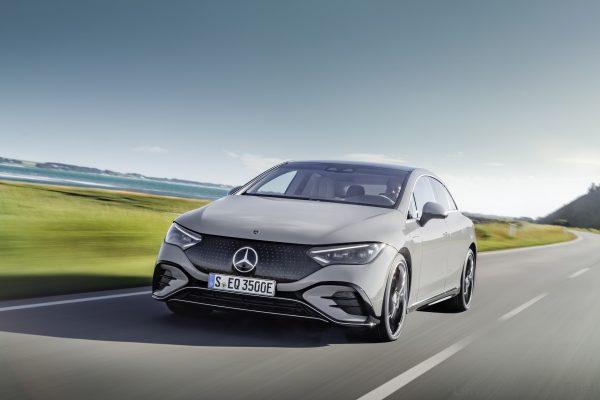Mercedes-Benz EQE presents an all-electric alternative to the E-Class.
Last year, Mercedes-Benz made a strong commitment towards electric vehicles. They promised at least 8 all-electric vehicles by 2022, and over the weekend they started to fatten up the electric portfolio with a performance version of the EQS, previews of an electric G-Class and Maybach EQS concept as well as this – the EQE.

The EQE will be the electric counterpart to the E-Class with two initial versions being made available. For now, only specifications of the EQE 350 were shared. This version gets a 215kW (288hp), 530Nm of torque motor. The EQE will be made at Breman and in Beijing.
EQE vs EQS
Just as the E-Class is to the S-Class, the EQE presents a smaller, more athletically proportioned sedan. It is shorter, as are its overhangs. It still features a similar design language, but also integrates a rear spoiler into the trunk lid for a sportier look, with rims options ranging from 19″ to 21″. Here’s how the EQE measures up against the EQS.
| EQE | EQS | |
| Wheelbase | 3120mm | 3210mm |
| Length | 4946mm | 5216mm |
| Width | 1961mm | 2125mm |
| Height | 1512mm | 1512mm |
| Boot Space | 430L | 610L |
In some dimensions, it’s actually comparable to the S-Class – which indicates that the CLS will not be getting an EQ variant, as even the design language of this E-Class has been to incorporate sleeker ‘4-door coupé’ proportions.
Equipment
The Mercedes-Benz EQE will feature some trickle-down equipment from the latest S-Class and EQS. This includes the new MBUX Hyperscreen which places high-resolution displays on the entire dashboard. In some markets, the 12.3″ OLED screen that’s dedicated to the front passenger can be used to watch videos or browse the internet. This screen automatically dims when the driver looks at it.

The EQE introduces a new safety feature that can detect and warn of microsleep. This is done by scanning driver eyelid movement using a camera.
The EQE also gets optional sound packages, driving modes for younger drivers and service personnel, in-car games, highlight mode and Digital Light projection using the voice assistant.
Mercedes-Benz EQ Drive System
The EQE 350 will sport an electric motor on the rear axle initially with 4MATIC versions coming later for a dual-motor setup. The EQE uses permanently excited synchronous motors, which delivers high power constancy and high efficiency.

The EQE will features a 90kWh lithium-ion battery with 10 modules run by innovative battery management software. Mercedes-Benz has created more sustainable cell chemistry for their batteries with reduced cobalt content versus standard lithium-ion designs.

In terms of suspension, the EQE gets four-link front suspension and multilink rear suspension that mirrors what’s present on the latest W223 S-Class. Optionally, the EQE can be equipped with AIRMATIC air suspension with ADS+ adaptive damping and rear-axle steering seperately. With rear-axle steering, the turning circle of the EQE reduces from 12.5 to 10.7 metres.

Driving Philosophy
Mercedes-Benz engineers looked to deliever consistent performance over multiple successive accelerations. To do this they had to design a sophisticated thermal concept and several different stages of energy recovery rates.
One-pedal driving is available through ECO Assist.

They also wanted to give drivers the option to travel without range anxiety by using “Electric Intelligence” plans to find the fastest and most convenient route, accounting for charging stops, range and driving style.

To preserve the Mercedes-Benz signature NVH character, the electric motors have been arranged in an optimised configuration with special foam mats around them. There’s also loads of foam around the rest of the body. The inverter cover features a layered construction and the motors are double-decoupled from the body via elastomeric bearings.
EQE technical data
| EQE 350 | ||
| Drive system layout | ||
| Electric motor | Type | Permanently agitated synchronous motor |
| Output | kW | 215 |
| torque with | Nm | 530 |
| Rated voltage | Volts | 328.5 |
| On-board charger (standard/option) | kW | 11/22 |
| AC charging time, three-phase(11/22 kW) | h | 8,25/4,25 |
| DC charging capacity, max. | kW | 170 |
| DC charging time at quick-charging station[3] | min | 32 |
| DC charging: max. range after15 minutes[4] (WLTP) | km | 250 |
| Vehicle | ||
| Length/width/height | mm | 4946/1961/1512 |
| Length/width/height (USA) | mm | 4995/1961/1513 |
| Wheelbase | mm | 3120 |
| Turning circle (without/with rear-axle steering 4.5°/10°) | m | 12.5/11.6/10.7 |
| Boot capacity, VDA | L | 430 |
| Power consumption and range | ||
| Power consumption (WLTP) | kWh/100 km | 19,3-15,7 |
| CO2 emissions (WLTP) | g/km | 0 |
| Range (WLTP) | km | 545-660 |










